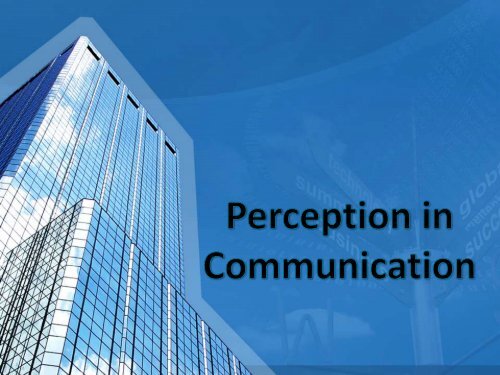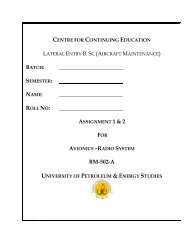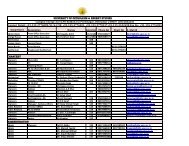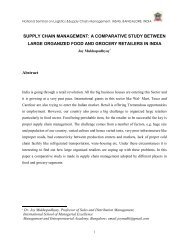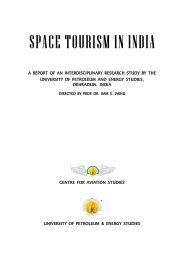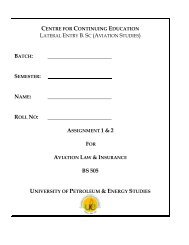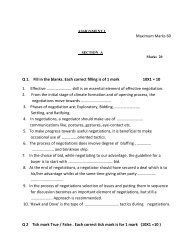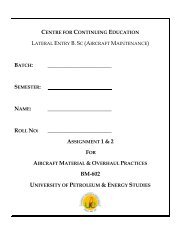Perception in Communication
Perception in Communication
Perception in Communication
You also want an ePaper? Increase the reach of your titles
YUMPU automatically turns print PDFs into web optimized ePapers that Google loves.
‘<strong>Perception</strong> as a process which <strong>in</strong>dividuals organize<br />
and <strong>in</strong>terpret their sensory impressions <strong>in</strong> order to<br />
give mean<strong>in</strong>g to their environment’<br />
Or<br />
‘The process by which an <strong>in</strong>dividual ma<strong>in</strong>ta<strong>in</strong>s<br />
contact with the environment’<br />
Or<br />
‘The process whereby an <strong>in</strong>dividual receives stimuli<br />
through the various senses and <strong>in</strong>terprets them’
• <strong>Perception</strong> is a mental process to get sensory<br />
impressions and attribut<strong>in</strong>g mean<strong>in</strong>g<br />
• What one perceives is generally different from<br />
objective reality<br />
• People see, read, hear and understand th<strong>in</strong>gs<br />
differently<br />
• Th<strong>in</strong>gs / words that satisfy or are expected to<br />
satisfy / fulfil needs and expectations are<br />
perceived quickly, others not.<br />
,
• One day a father of a very wealthy family took his son on a trip<br />
to the country with the firm purpose of show<strong>in</strong>g his son how<br />
poor people live.<br />
They spent a couple of days and nights on the farm of what<br />
would be considered a very poor family. On their return from<br />
the trip, the father asked his son, "How was the trip?" "It was<br />
great, Dad".<br />
"Did you see how poor people live?" the father asked.<br />
"Oh yes", said the son. "So, tell me, what did you learn from<br />
the trip?" asked the father.<br />
The son answered, "I saw that we have one dog and they had<br />
four. We have a pool that reaches to the middle of the garden<br />
and they have a creek that has no end. We have imported<br />
lanterns <strong>in</strong> our garden and they have the stars at night.
• Our patio reaches to the front yard and they have the<br />
whole horizon. We have a small piece of land to live<br />
on and they have fields that go beyond our sight. We<br />
have servants to serve us, but they serve others.<br />
We buy our food, but they grow theirs. We have walls<br />
around our property to protect us, they have friends<br />
to protect them."<br />
The boy's father was speechless. Then his son<br />
added, "Thanks, Dad for show<strong>in</strong>g me how poor we<br />
are."<br />
Isn't perspective a wonderful th<strong>in</strong>g ? Makes you<br />
wonder what would happen if we all gave thanks for<br />
everyth<strong>in</strong>g we have, <strong>in</strong>stead of worry<strong>in</strong>g about what<br />
we don't have.*********
‣ People’s understand<strong>in</strong>g of the ideas, facts,<br />
impulses are based on their perception<br />
‣ What reality is not reality itself.<br />
‣ Number of factors operate to shape and at times<br />
filter and distort understand<strong>in</strong>g<br />
‣ Factors reside <strong>in</strong> speaker and receiver<br />
‣ When a reader/ receiver <strong>in</strong>terprets what he<br />
reads or listens the <strong>in</strong>terpretation is <strong>in</strong>fluenced<br />
by personal characteristics I.e., attitude,<br />
experience, <strong>in</strong>terest and so on.
• A word has different mean<strong>in</strong>gs<br />
• Divergent <strong>in</strong>tention to use a word / jargon<br />
• Unsatisfied needs – strong <strong>in</strong>fluences.<br />
• Experience – boss dictatorial / autocratic –<br />
change <strong>in</strong> behaviour – changed perception
• Our perception of reality is less important than<br />
reality itself.<br />
• It may be argued that there is no ultimate reality,<br />
only the illusion of our perceptions.<br />
• Our perceptions are <strong>in</strong>fluenced by:<br />
<br />
<br />
<br />
Physical elements -- what <strong>in</strong>formation your eye or<br />
ear can actually take <strong>in</strong>, how your bra<strong>in</strong> processes it.<br />
Environmental elements -- what <strong>in</strong>formation is out<br />
there to receive, its context.<br />
Learned elements -- culture, personality, habit: what<br />
filters we use to select what we take <strong>in</strong> and how we<br />
react to it.
• Colour bl<strong>in</strong>d people will not perceive ‘Red’ the way<br />
as other people do.<br />
• Those with normal vision may physically see ‘Red’<br />
similarly, but will <strong>in</strong>terpret it differently<br />
<br />
<br />
<br />
Red mean<strong>in</strong>g "stop" or "anger" or "excitement" or "<strong>in</strong><br />
debt" (US)<br />
Red mean<strong>in</strong>g "good fortune" (Ch<strong>in</strong>a)<br />
Red mean<strong>in</strong>g your school's colours
• The world deluges us with sensory<br />
<strong>in</strong>formation every second.<br />
• Our m<strong>in</strong>d produces <strong>in</strong>terpretations,<br />
images / models and perceptions to<br />
survive,<br />
• Need to select what <strong>in</strong>formation we<br />
attend to and what we remember.
• Sends out strong physical stimulus: contrast, bl<strong>in</strong>k<strong>in</strong>g,<br />
loudness, etc.<br />
• Elicits emotion -- TV dramas, memory aid: when tak<strong>in</strong>g notes<br />
on an article, write your emotional response to it<br />
• Is unexpected? (This may draw your attention or conversely,<br />
you may miss it entirely with your m<strong>in</strong>d fill<strong>in</strong>g <strong>in</strong> the miss<strong>in</strong>g<br />
pieces you expected to receive.)<br />
• Fits a pattern<br />
• Previous knowledge that gives it context<br />
• Interests you<br />
• Connects to basic needs (belong<strong>in</strong>g, sex, danger, hunger...)<br />
Cultural filters will be determ<strong>in</strong><strong>in</strong>g the answers to these<br />
questions—<br />
> What hooks your emotions?<br />
> What is "normal" and what is "unexpected", etc.
Stimulus Conditions<br />
• Intensity<br />
• Size<br />
• Message language<br />
• Novelty<br />
• Position / status<br />
• Context
Audience Conditions<br />
• Information needs<br />
• Attitude<br />
• Values<br />
• Interests<br />
• Confidence<br />
• Social context
• Noise is a physical disturbance <strong>in</strong> the signal (such<br />
as static, a torn page <strong>in</strong> a magaz<strong>in</strong>e, glare, channel<br />
overload).<br />
• ‘Noise’ describes anyth<strong>in</strong>g that might distort or<br />
<strong>in</strong>terrupt communication, e.g :-<br />
Mental distraction--your attention is elsewhere<br />
Relationship between those who are communicat<strong>in</strong>g<br />
Language gap<br />
Emotional reactions<br />
Differences <strong>in</strong> <strong>in</strong>terpretation, <strong>in</strong> knowledge
1. Every person <strong>in</strong>volved <strong>in</strong> the<br />
communication has perceptions and<br />
filters which structure how they<br />
send or receive a message.<br />
2. A message is content PLUS form --<br />
both convey mean<strong>in</strong>g.


